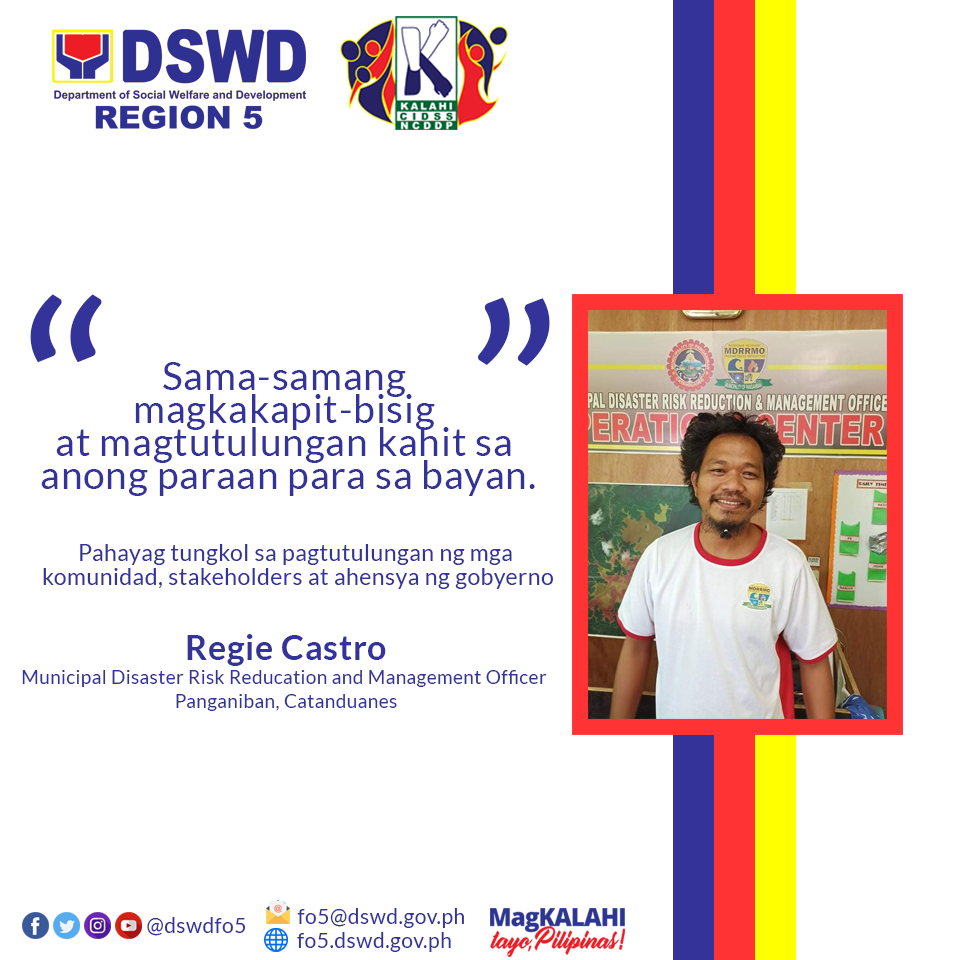
Being resilient does not only means the ability to withstand or recover from difficult conditions. It is also being prepared in times of crisis.
In the Philippines, resiliency is relevant as the country is being hit with natural disasters specifically typhoons. The country is visited by an average of 20 typhoons every year. Recently, the Philippines was gravely affected by the Coronavirus Disease (COVID-19) pandemic causing an economic fallout.
As part of the recovery efforts from the pandemic, the Department of Social Welfare and Development Kapit-Bisig Laban sa Kahirapan – Comprehensive and Integrated Delivery of Social Services (DSWD Kalahi-CIDSS) shifted its mode of implementation from Local Government Unit (LGU)-led implementation to Disaster Response Operations Procedure (DROP).
This is to provide the basic services and resources to the communities affected by the pandemic.
In line with this, the Local Disaster Risk Reduction and Management Councils (LDRRMCs) in Kalahi-CIDSS areas were committed to support the DROP implementation of the program.
DISASTER RESPONSE EFFORTS
One of the LDRRMCs who is part of the implementation is the Municipal DRRMC of Panganiban in Catanduanes.
According to Regie Castro, 36, MDRRM officer, the MDRRMC serves as partner of DSWD Kalahi-CIDSS in response to the needs of the communities during the implementation.
Castro shared that the MDRRMC supervises all disasters response efforts in their locality including the COVID-19 disaster response.
“Kami ang gumagawa ng aksyong pangkalahatan upang mabawasan o matigil ang pagkalat ng sakit. Isa na rito ang pagplano, pag-execute ng mga kailangang gawin upang maibsan ang epekto ng COVID-19 sa komunidad,” he explained.
(We create possible actions to curb the spread of the virus such as planning and execution of measures to lessen the adverse effects of COVID-19 in the community.)
The MDRRM officer also cited problems being encountered by communities such as low income or no source of income, lack of food supply, unemployment, medical needs and lack of isolation or quarantine facilities.
Castro emphasized that the program is one of the partners who helped their municipality during the crisis.
“Dahil sa mga sub-projects na iminumungkahi sa aming bayan naging madali para sa amin ang pagpalawig o pagbabahagi ng kaalaman tungkol sa COVID-19, nagkaroon ng karampatang tulong para sa mga mahirap nating kababayan na nawalan ng kabuhayan o kaya naman sa mga indibidwal na natanggal sa trabaho,” he said.
(Because of the projects being proposed by communities, it will be easy on our part to share information about COVID-19, provide assistance to poor households without livelihood or individuals who lose their jobs.)
In the DROP implementation, the barangays will identify the priority disaster response programs, projects and activities (PPAs) based on their needs. These proposals will be reviewed and approved by the MDRRMC through the Municipal Inter-Agency Committee (MIAC) Technical Desk Review ensuring that the Municipal Health Office (MHO) standards are being followed.
WAR AGAINST PANDEMIC
As one of the frontliners, Castro said that despite the fear of being in the middle of the pandemic, he stood bravely to serve the municipality.
Castro correspondingly compared their experiences on COVID-19 as a war without reinforcements.
“Pero nakakita kami ng liwanag at ang liwanag na iyon lumitaw ang KALAHI-CIDDS para tulungan kami sa digmaang aming hinaharap,” he continued.
(But we were able to see light with the appearance of Kalahi-CIDSS who is there to assist us on the war we are facing.)
With collective effort of communities, stakeholders and government agencies, the country will recover from the crisis as it adapts to the new normal.
“Sama-samang magkakapit-bisig at magtutulungan kahit sa anong paraan para sa bayan,” Castro concluded.
(Let us join hands and help each other in whatever means for our community.) /ramsertan
With reports from Ma. Cristina Agripa, Area Coordinator
ABOUT DSWD KALAHI-CIDSS
DSWD Kalahi-CIDSS is a poverty alleviation program that uses the Community-Driven Development (CDD) approach that helps communities in poor municipalities to identify challenges along poverty, make informed decisions and gives control of resources to address local poverty.
The program allocated PhP3,895,200.00 for the municipality of Panganiban, Catanduanes under DROP implementation that will be divided among barangays.
The fund allocation for each barangay will be determined based on the following criteria: (a) 2017 National Household Targeting System for Poverty Reduction (NHTS-PR) list of poor households – 30% and (b) 2017 data number of population – 70%.
For more details about DSWD Kalahi-CIDSS, follow this link:
